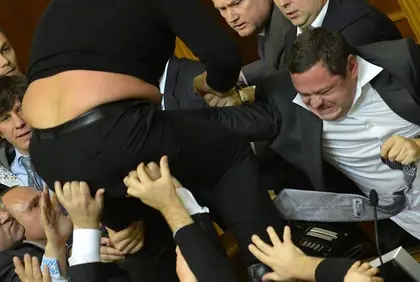The new
parliament, elected on Oct. 28, convened for the first time on Dec. 12. But
even a full working day was not enough to elect a speaker or confirm a prime
minister – the two key votes that were expected on the first day.
The
Verkhovna Rada members, however, vowed to stay in session all night on Dec. 12, if necessary, to at least elect a new speaker. They failed.
JOIN US ON TELEGRAM
Follow our coverage of the war on the @Kyivpost_official.

The three
oppositional parties, which have a total of 178 out of the 445 filled seats in
parliament, managed to block most of the pro-presidential Party of Regions
initiatives. The oppositionists also persistently contested the forming of a
Communist Party faction of 33 deputies in parliament on technicalities,
highlighting the divisions within the new parliament and how difficult it will
be to find consensus.
Meanwhile, outside, Femen — the famous group of topless female protesters — took off their clothes in front of the Rada to protest against the incompetence and corruption of the nation’s lawmakers. The demonstrators were quickly arrested and carried away by police officers.
Ukraine’s
legislature has 450 seats in total, but five still remain vacant until new
elections take place in disputed districts, sometime in 2013.
The
swearing-in ceremony at the Rada looked like a high-life event: the hall was
packed with lawmakers, diplomats and swarms of reporters. Even a church leader
attended. Two deputies who did not grace the previous parliament with their
presence very often – businessman Yuriy Ivaniushchenko from the Party of
Regions and Kostyantyn Zhevago, formerly from the imprisoned Yulia Tymoshenko’s
Batkivshchyna faction – showed up for the ceremony. Ivaniushchenko told reporters
that this time he will come to parliament more frequently.
When asked
by the Kyiv Post what faction he is going to ally with in the new parliament
and whether he would support the candidacy of Mykola Azarov as prime minister,
the 38-year-old billionaire Zhevago remained tight-lipped. Zhevago also promised not to skip plenary sessions this time.

The
solemnity of the moment was lost the moment that two of the deputies got pushed
and shoved their way out of the session hall. More fights and scuffles broke
out later.
Oleksandr Tabalov and his son, Andriy, were both elected as Batkivshchyna party representatives, but refused to join the party’s faction the day before the parliament was due to convene. The opposition interpreted as treason and demanded that
they renounce their seats. Oleksandr Tabalov told reporters that he and his son
“are not going [to join] any faction.”
Andriy Tabalov, in one of his interviews to the Ukrainian media, said
they were “pressured” by the government.
There is no
legal mechanism to force the two tushkis – the nickname for those who desert their party and join someone else’s
— to give up their seats, though. So the opposition decided to apply
psychological pressure, pinning their portraits to the podium, with the word
“traitors” spelled out underneath. Iryna Herashchenko, a member of Vitali Klitschko’s Ukrainian
Democratic Alliance for Reforms faction, said the duo will be prevented from
entering the session hall for all five years by the opposition.

Oleh
Tiahnybok, leader of the Svoboda party, called the incident “a blow not only to
Batkivshchyna, but to all of the opposition.” Perhaps, to compensate for the
blow, his brother Andriy and several accomplices used one of the many breaks in
sessions to cut down a metal fence surrounding the Rada. Then they broke a door
to get back into the building because it was blocked by a special police unit.
Andriy
Tyahnybok was elected to parliament in a single-mandate constituency in Lviv
Oblast. Like all lawmakers he enjoys immunity from criminal prosecution.
While the
opposition was entertaining themselves and viewers in parliament, Azarov —
Ukraine’s past and acting prime minister — was anxiously waiting to see
whether a vote on his candidacy will take place. Hanna Herman, a former adviser
to President Viktor Yanukovych, elected to parliament on the Party of Regions
ticket, said that Azarov was “very nervous” since the previous day.
He had
every reason to be. When former parliament speaker Volodymyr Lytvyn announced
his presence in the session hall in the morning, the opposition shouted
“Shame!”
The Party
of Regions only has 210 seats in the Rada, but the Communist Party said they
were also considering supporting Azarov’s candidacy with their 33, a majority. But
as the Rada’s first day was coming to an end, the vote looked like it may have to wait for another
day.

Kyiv Post editor Katya Gorchinskaya can be reached at [email protected]. And staff writer Yuriy Onyshkiv can be
reached at [email protected]
You can also highlight the text and press Ctrl + Enter




